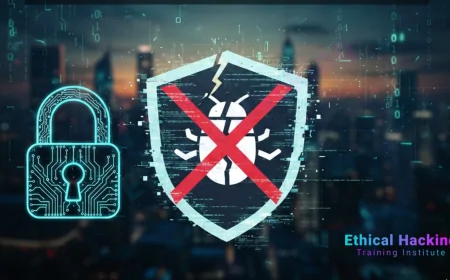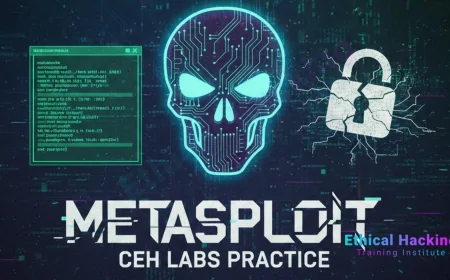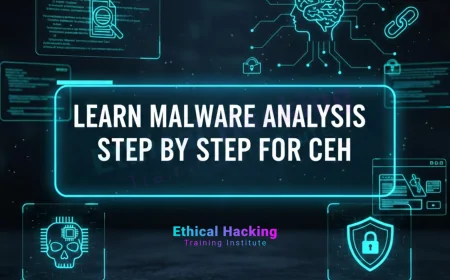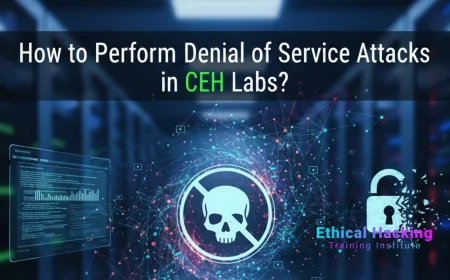CompTIA Certified Ethical Hacker: How It Compares to EC Council CEH Certification | CEH vs CompTIA PenTest+: A Detailed Ethical Hacking Certification Comparison
Compare CompTIA’s PenTest+ and Security+ with EC-Council CEH. Understand the differences in cost, exam format, tools, job roles, and which ethical hacking certification is right for you.
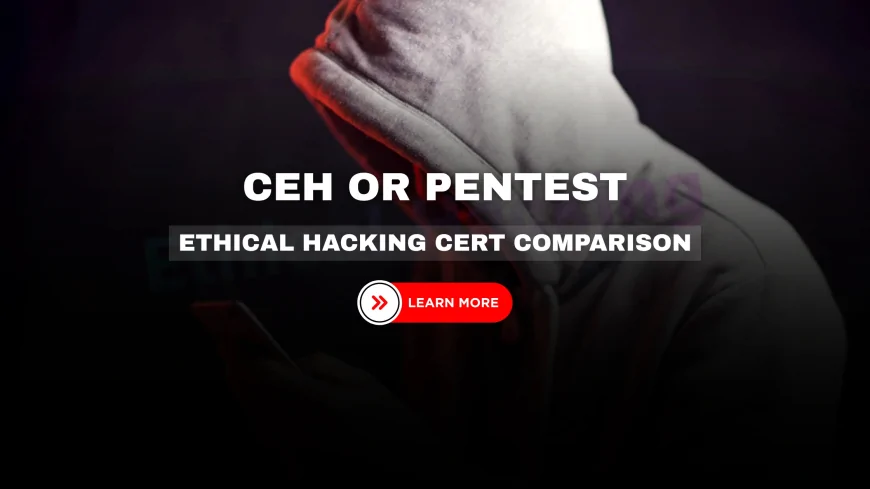
Table of Contents
- Introduction
- What Is CompTIA Certified Ethical Hacker?
- Overview of EC‑Council CEH
- Curriculum Comparison
- Exam Structure & Format
- Labs & Tools Access
- Cost & Investment
- Industry Recognition & Value
- Career Paths & Salaries
- Pros & Cons
- Which Is Better for You?
- FAQs
- Conclusion
Introduction
Cybersecurity professionals often seek certifications that validate their ethical hacking and penetration testing skills.CEH by EC-Council and CompTIA’s PenTest+ are two popular options for professionals pursuing ethical hacking careers.n this comprehensive comparison, we examine their curricula, exam formats, costs, industry recognition, and application to help you decide which credential suits your career goals best.
What Is CompTIA Certified Ethical Hacker?
As of 2025, CompTIA hasn't released a stand-alone "Certified Ethical Hacker" certification analogous to EC‑Council’s CEH. Instead, CompTIA emphasizes ethical hacking concepts through its CompTIA PenTest+ and the Security+ certifications. CEH training emphasizes real-world simulations to equip ethical hackers with job-relevant skills and experience.
Overview of EC‑Council CEH
The Certified Ethical Hacker (CEH) certification, offered by the EC‑Council (International Council of E-Commerce Consultants), is one of the most recognized and in-demand credentials in the cybersecurity industry. It validates a professional’s ability to identify vulnerabilities in computer systems and ethically exploit them to protect organizations from malicious attacks.
CEH training emphasizes real-world simulations to equip ethical hackers with job-relevant skills and experience. It emphasizes the tools, methodologies, and techniques used by black-hat hackers—empowering security professionals to think like attackers and proactively defend systems.
Key Features of CEH:
- Exam Code: 312‑50 (CEH v12 or latest)
- Duration: 4 hours
- Format: 125 multiple-choice questions
- Delivery: ECC Exam Portal / Pearson VUE
- Eligibility: EC-Council-approved training or 2 years of InfoSec experience with application approval
CEH Practical (Optional Add-On):
- Hands-on exam lasting 6 hours
- Simulates 20+ real-world ethical hacking challenges
- Evaluates expertise in areas such as vulnerability assessment, system exploitation, malware analysis, and beyond.
Learning Modules Include:
- Footprinting & Reconnaissance
- Scanning Networks
- Enumeration
- System Hacking
- Malware Threats
- Sniffing
- Social Engineering
- Denial-of-Service Attacks
- Session Hijacking
- Web Server and Web Application Attacks
- Wireless Network Security
- Cryptography and Cloud Computing
Government sectors, military branches, banking institutions, and leading corporations worldwide recognize CEH as a standard for ethical hacking expertise. It’s a strong choice for individuals aiming for roles in penetration testing, red teaming, cybersecurity consulting, and security auditing.
Curriculum Comparison
CompTIA PenTest+ / Security+
- Security+: Focuses on security fundamentals including access control, network architecture, and risk management.
- PenTest+: Dives into ethical hacking workflows — planning threats, scanning and exploitation, and reporting.
EC‑Council CEH
- Covers in-depth tools like Nmap, Metasploit, Wireshark, and others.
- Focuses on critical advanced areas like secure communications, web vulnerabilities, wireless threats, and human-based attack vectors.
- Learning progresses through phases of real-world attack simulation.
Exam Structure & Format
CompTIA Certifications:
- Security+ (SY0‑601): 90 questions, multiple choice and performance-based, 90 minutes.
- PenTest+ (PT0‑002): 115 questions, multiple choice and performance-based, 165 minutes.
EC‑Council CEH (312‑50):
- 125 multiple-choice questions within 4 hours.
- Practical test: 20+ scenarios in 6 hours, simulating real-world hacking tasks.
Labs & Tools Access
- CompTIA PenTest+: Integrates performance-based simulations but typically lacks dedicated extended virtual labs.
- EC‑Council CEH: Offers hands-on labs through iLabs with real-world tools and environments.
Cost & Investment
CompTIA Pathway Costs (2025 estimates):
- Security+: $392 USD exam
- PenTest+: $426 USD exam
- Training/self-study: $400–$1,400 depending on provider
EC‑Council CEH Costs:
- CEH exam: $950 USD
- Practical: $199–$299 USD (when taken separately)
- Training cost: $1,200–$5,000 USD
Industry Recognition & Value
When it comes to industry credibility, both the CompTIA certifications (Security+, PenTest+) and EC-Council’s CEH are well-respected in the cybersecurity field—but they serve different purposes and audiences.
EC-Council CEH
- Globally recognized as a standard for ethical hacking and penetration testing skills.
- CEH is often listed in job postings for roles like Ethical Hacker, Penetration Tester, Security Analyst, and Red Team Operator.
- Included in the U.S. Department of Defense (DoD) 8570/8140 approved baseline certifications.
- Used by Fortune 500 companies, defense contractors, and government agencies to verify advanced cybersecurity competence.
CompTIA Certifications
- Security+ is considered a foundational certificate and is often a prerequisite for entry-level security positions.
- PenTest+ is recognized as a vendor-neutral ethical hacking certification that emphasizes hands-on, performance-based testing.
- CompTIA certifications are popular in managed IT service environments, small-to-mid-size companies, and international markets.
- Also listed in DoD 8570 compliance framework, especially for roles involving system security and vulnerability analysis.
Summary: CEH offers higher recognition in specialized security roles and regulated industries, while CompTIA credentials are better suited for broader, foundational roles in IT security and cybersecurity support. Professionals often earn both over time, starting with CompTIA and advancing to CEH as their career progresses.
Career Paths & Salaries
- Security+ holders: Security administrator, system/network support (avg. $60k–$80k USD)
- PenTest+ certified: Junior penetration tester, vulnerability assessment analysts (avg. $75k–$95k USD)
- CEH certified: Penetration tester, ethical hacker, security analyst (avg. $80k–$120k USD)
Pros & Cons
CompTIA Pathway
- Pros: Cost-effective, vendor-neutral, performance-based questions.
- Cons: Lacks deeper hacking tool exposure and dedicated hacking labs.
EC‑Council CEH
- Pros: Extensive tool coverage, practical labs, recognized globally.
- Cons: Higher cost, more theoretical multiple-choice exam front-loaded.
Which Is Better for You?
Choosing between CompTIA’s PenTest+/Security+ and the EC‑Council CEH certification depends on your current skill level, career goals, budget, and preferred learning style. Both paths offer valuable credentials, but each is designed for a different audience and purpose.
Choose CompTIA PenTest+ or Security+ if:
- You are just entering the field of cybersecurity and need foundational knowledge.
- Your budget is limited and you’re looking for a cost-effective certification route.
- You want to start with a vendor-neutral certification that’s broadly recognized and easier to renew.
- You prefer performance-based exams that test practical skills over multiple-choice theory.
Choose EC‑Council CEH if:
- You want in-depth exposure to ethical hacking tools and techniques.
- You are aiming for advanced cybersecurity roles like penetration tester, red team analyst, or ethical hacker.
- You need a credential that satisfies government or regulatory requirements (e.g., DoD 8570 compliance).
- You prefer guided training with structured labs, simulations, and industry-recognized curriculum.
Ultimately, if you're early in your journey, CompTIA's Security+ and PenTest+ will provide a solid base. But if you're targeting more specialized ethical hacking roles with hands-on technical depth and industry recognition, the CEH is likely the better long-term investment.
FAQs
1. Does CompTIA offer a standalone Certified Ethical Hacker certificate?
Not currently. Ethical hacking topics are covered through Security+ and PenTest+, not a specific “CEH” credential.
2. Can I start with Security+ before PenTest+?
Yes. Security+ lays the security fundamentals that make the advanced PenTest+ content easier to grasp.
3. Which is more hands-on: CEH or PenTest+?
PenTest+ includes performance-based questions; CEH offers deeper tools experience through practical labs.
4. Are EC‑Council CEH labs worth the investment?
Yes. CEH’s iLabs simulate real-world hacking environments and aid practical skill development.
5. What is the average time to prepare for PenTest+?
On average, 3–4 months of study is sufficient for someone with basic networking and security knowledge.
6. Is PenTest+ ANSI accredited?
Yes. PenTest+ is ISO–ANSI accredited, which adds to its reliability.
7. Can I take PenTest+ and CEH in sequence?
Absolutely. Many professionals complete PenTest+ first and then pursue CEH for advanced capabilities.
8. Which certification is preferred by employers?
CEH is often specified for pentesting roles, while PenTest+ and Security+ are preferred for general cybersecurity roles.
9. Do employers value performance-based exams?
Yes. Performance-based and practical exams align closer to job duties and are highly regarded.
10. How long is CEH valid?
CEH is valid for three years and requires continuing education credits to renew.
11. Does CEH Practical improve job prospects?
Yes. It demonstrates hands-on prowess and boosts credibility with recruiters.
12. Can I self-study for PenTest+?
Yes. Many candidates use study guides and labs to prepare independently.
13. What’s the passing score for PenTest+?
PenTest+ uses a scaled score of 0–900, with 750 required to pass.
14. Is CEH more expensive than PenTest+?
Yes. CEH typically costs significantly more when you factor labs and practical exams.
15. Are there prerequisites for PenTest+?
Recommended but not enforced: two to four years in network or security roles plus Security+ certification.
16. What career can I expect after PenTest+?
Junior penetration tester, vulnerability analyst, or security engineer roles are common next steps.
17. Does PenTest+ cover web application hacking?
Yes, it includes web and cloud vulnerability analysis but not as deeply as CEH.
18. How do I renew PenTest+ and CEH?
Both require Continuing Education Units (CEUs): PenTest+ every three years; CEH every three years via EC‑Council ECE program.
19. Can CEH holders skip PenTest+?
Yes. CEH alone is sufficient for many cybersecurity roles; PenTest+ is optional if additional credentials are desired.
20. Are there regional alternatives to these certifications?
Yes. Certifications like CREST, OSCP, and GIAC exist and may be preferred in certain regions or sectors.
Conclusion
Both the CompTIA pathway and EC‑Council CEH offer valuable cybersecurity credentials. Your choice should be guided by your career stage, budget, desired depth of knowledge, and long-term goals. Whether you begin with Security+ and PenTest+ or dive directly into CEH, your certification journey can strongly position you in today’s cybersecurity workforce.
What's Your Reaction?
 Like
0
Like
0
 Dislike
0
Dislike
0
 Love
0
Love
0
 Funny
0
Funny
0
 Angry
0
Angry
0
 Sad
0
Sad
0
 Wow
0
Wow
0
